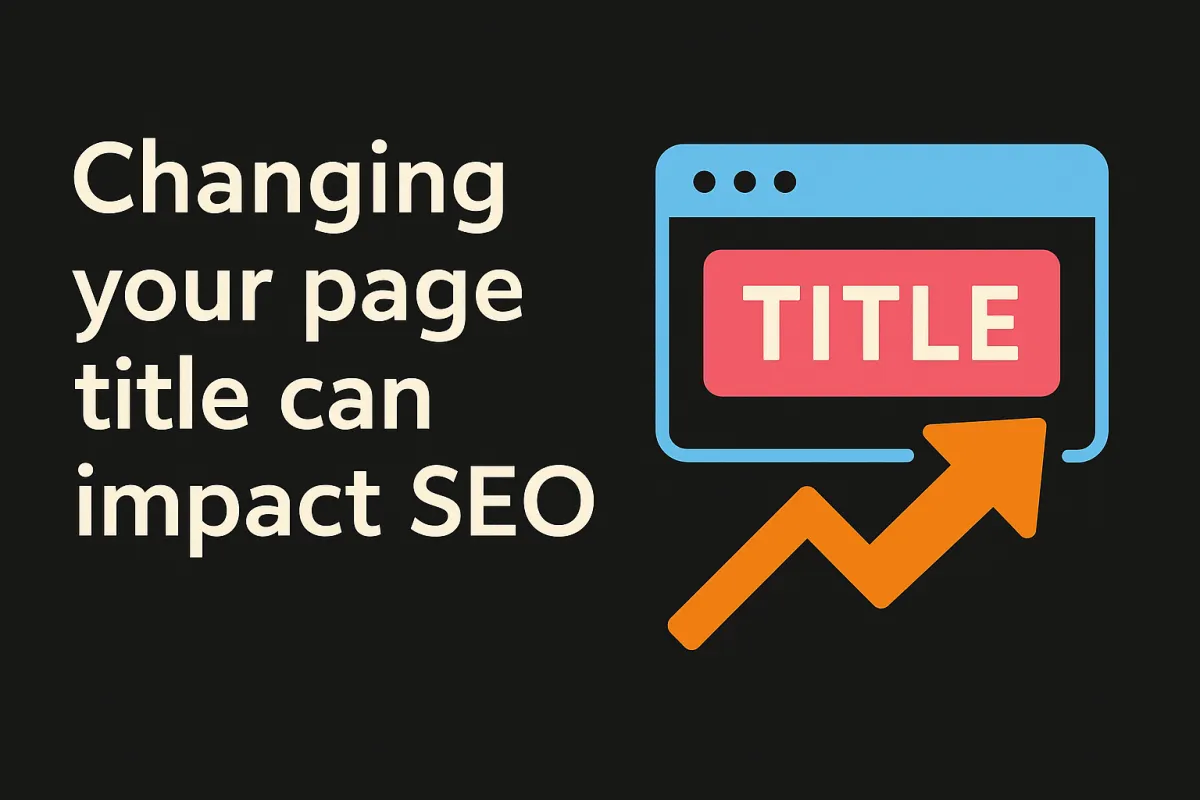
Does Updating Page Titles Hurt SEO? Expert Advice from Fusion Growth
Does Updating Page Titles Hurt SEO? Expert Advice from Fusion Growth
Yes, Changing a page title can affect SEO, for better or worse. If done correctly with intent, it can improve rankings and click-through rates (CTR). If done recklessly, it can tank your visibility. This blog explains how to change titles safely, when it's worth doing, and what services we offer to guide your SEO efforts.
What is a Page Title?
A page title (or title tag) is the HTML element that defines a page’s title in search engine results and browser tabs. It appears as the blue clickable link in Google.
For example:
<title>Best Digital Marketing Agency in Ipswich | FusionGrowth</title>
It’s one of the strongest on-page SEO signals, informing search engines and users alike about the page’s content.
🎯 Why Would You Want to Change a Page Title?
There are multiple valid reasons to update your page title:
Your keyword strategy has changed
You want to boost click-through rate (CTR)
You’re rebranding
You're targeting a new geographic location
You're improving clarity or user relevance
You’re aligning with Google’s search intent shift
💡 At FusionGrowth’s SEO Services, we often run A/B tests on page titles to see what performs best in SERPs without hurting rankings.
Does Changing Page Title Affect SEO Negatively?
Yes - but only if mishandled.
Here are common SEO pitfalls when changing title tags:
Mistake - Impact on SEO
Removing main keyword - Rankings drop for target queries
Making it too vague or generic - Reduced relevance, lost clicks
Over stuffing keywords - Penalized for spammy optimization
Constant changes without testing - Algorithm confusion, ranking volatility
When Changing Your Title Can Improve SEO
CTR Optimisation
A catchy, benefit-driven title can increase click-through rates which may in turn boost rankings via behavioral signals.Keyword Alignment
Updating a title to better match user search intent or emerging trends helps stay relevant and visible.Local SEO Targeting
Adding location-based modifiers like “Ipswich” or “Brisbane Southside” can significantly help rank in local searches. This aligns perfectly with our Google My Business Posting Plan.Content Refresh or Expansion
If your content was upgraded, the title should reflect its new depth or scope.
How Often Should You Change Page Titles?
Only change titles when:
Your page is underperforming in CTR or rankings
You’ve researched new keyword opportunities
There’s a clear, data-driven reason
Avoid constant title changes. Google may interpret this as instability or spam tactics.
How to Safely Change a Page Title (The Right Way)
Step 1: Audit Current Performance
Use tools like Google Search Console or SEMRush
Check CTR, impressions, and keyword rankings
Compare performance of current vs. potential new titles
Step 2: Understand Search Intent
Use your keyword tools to analyze:
Commercial intent (“buy,” “hire,” “best”)
Informational queries (“how to,” “why does…”)
Local modifiers (“near me,” “in Ipswich”)
Step 3: Update Title Strategically
Structure your title using best practices:
Keep it under 60 characters
Lead with the main keyword
Include a value-driven phrase
End with your brand name
Example:
✅ “Does Changing Page Title Affect SEO? | FusionGrowth”
❌ “Home” or “Welcome to Our Website”
Step 4: Monitor & Measure
Use A/B testing for large pages
Track performance weekly for 30 days
If performance drops, consider rolling back
Best Practices for Page Titles in 2025
Best Practice - Why It Matters
Include primary keyword early - Search engines prioritize first words
Keep it concise (under 60 chars) - Avoids truncation in SERPs
Use power words (e.g., “Top,” “Best”) - Boosts CTR through compelling language
Add location when applicable - Helps with Local SEO visibility
Reflect actual content on the page - Improves dwell time and reduces bounce
Related Services We Offer at FusionGrowth
At FusionGrowth, we take your SEO beyond titles. We offer:
Let’s elevate every part of your digital strategy not just your titles.
A/B Testing Titles – Our Proven Formula
We use Click-Through Rate (CTR) + Rank Stability Score to decide when to lock in title changes.
Our formula:
(CTR Post-Change – CTR Pre-Change) / Bounce Rate Impact = Title ROI
If the ROI is positive over 30 days, the change stays. If not, we revert and test again.
Real-World Case Study: FusionGrowth Client
Client: Local Plumber in Logan
Old Title: “Home”
New Title: “Emergency Plumber Logan – 24/7 Plumbing | Plumbologist”
📈 Results within 21 days:
+98% increase in CTR
+15 positions in Google
+47% more traffic
Moral? Don’t sleep on your title tag strategy.
Does Changing Page Title Affect SEO? Yes If You Don’t Know What You’re Doing
The bottom line is this:
Changing your page title can absolutely affect SEO. It can skyrocket your traffic or sabotage your visibility depending on your strategy.
If you’re serious about SEO, title testing should be methodical, data-backed, and user-focused.
Need help with safe, smart, strategic changes?
📞 Let’s talk → Book a Free SEO Strategy Call
FAQs About Changing Page Titles and SEO
❓ Does Google penalise frequent title changes?
No, but frequent, unnecessary changes may reduce trust or trigger volatility.
❓ Should every title include keywords?
Yes - but don’t force them. Make it natural and user-focused.
❓ Will my rankings drop after a title change?
Possibly for a few days. Monitor closely and compare CTR/position over time.
If you’ve been asking “does changing page title affect SEO?”, the answer is YES - but it depends on how, why, and when you do it.
When you partner with FusionGrowth, we handle that data-driven strategy, protect your rankings, and drive real growth.
🧠 Want expert help?
📲 Contact us now
📍 Serving Ipswich, Brisbane & beyond
Powered by SEO. Driven by results.
